The EAT Lancet Commission has just released a new, drastic recommendation for a global dietary shift. Their “flexitarian” diet recommends less than half an ounce of red meat per day, less than one ounce of white meat per day, one ounce of fish a day, 1/4 of an egg, and 9 ounces of milk (or a “dairy equivalent,” which would mean about 2oz of cheese) per day.
To give you a sense of how small half an ounce is, consider this image of a 4oz steak… Cut this steak into 8 pieces. You can eat less than 1/8th of this steak. A small bite, that’s it.

This means the average person would be tripling their consumption of beans and pulses, and more than quadrupling their intake of nuts and seeds. Here’s the actual breakdown of what’s allowed in EAT Lancet’s report.
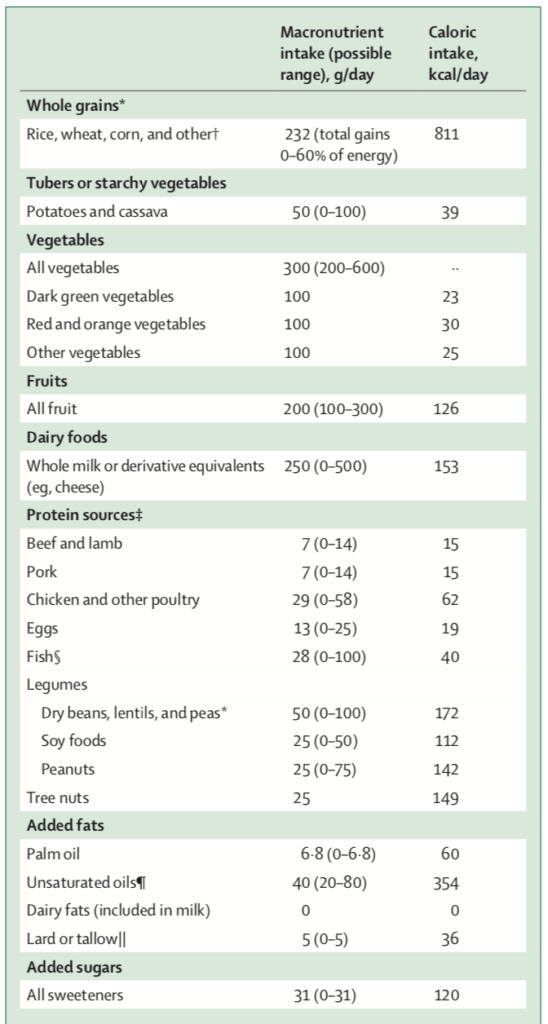
A few things annoy me about this, like how we’re “allowed” to eat more calories from sugar than from meat or eggs.
[Tweet “According to EAT Lancet, you can eat 8 tsp of sugar but only 1/4 egg per day #yes2meat”]
Palm oil has its own category even though most places can’t grow palm, it needs to be transported, and the growing methods are not sustainable… and yet we can’t eat any butter. The report is recommending we reduce processed foods yet the fats recommended are ultra-processed, inflammatory seed oils.
We’re being told to eat more calories worth of fruit than vegetables (fruits are not as nutritious as vegetables and for those looking to improve their metabolic health, fruit will not help). And at over 800 calories a day, who is really going to be eating unprocessed, “whole” grains? Thanks to the American Heart Association, most people think sugary breakfast cereals are a “whole grain” food.
How will people interpret this? As a dietitian, I consider Nutrigrain bars more like a cookie than a breakfast item, however I believe people are going to interpret foods like cereal bars, because of their “whole grain” claims, an appropriate breakfast food.
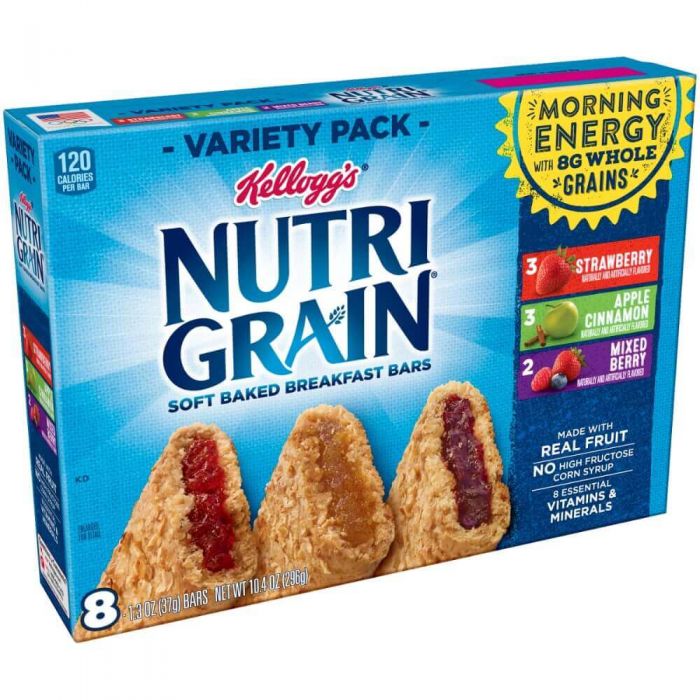
The average consumer is not eating brown rice and wheat berries, and to vilify eggs and meat will do more harm than good. When we’re seeing diabetes-level blood sugar spikes in healthy people (who are now the minority) after eating a bowl of corn flakes and milk, clearly the recommendation to eat 60% of calories from grains is not a good idea.
I’m sure many others in the real food community will have different things to say about the high amount of grains and oils, which I have a major problem with. Because there were just so many things to unpack in the paper, and I’m currently making a film about the nutritional and environmental benefits of “better meat“, I’m going to dive into the anti-meat claims for this post.
Others in the real food community have already written here and here about some of the bias and potential conflicts of interest behind the authors of the EAT Lancet report. Those who feel that meat eaters are as bad as smokers and should eat their meals outside of the restaurant are obviously not coming from a place of reason and should be removed from decisions involving dietary policy. And while the EAT Lancet paper admits that “animal production can also be essential for supporting livelihoods, grassland ecosystem services, poverty alleviation, and benefits of nutritional status the advice is “meat is bad for your health and the environment”.
[Tweet “The consequences of a reduction in meat could be devastating for people and the planet. “]
1. There’s No Proof That Meat Will Kill You
The EAT Lancet report greatly exaggerates the studies linking meat eating to poor health. The studies vilifying the health effects of meat are based on observational epidemiology, which can’t show actual cause, only associations. Lots of things are associated with other things, like this example:
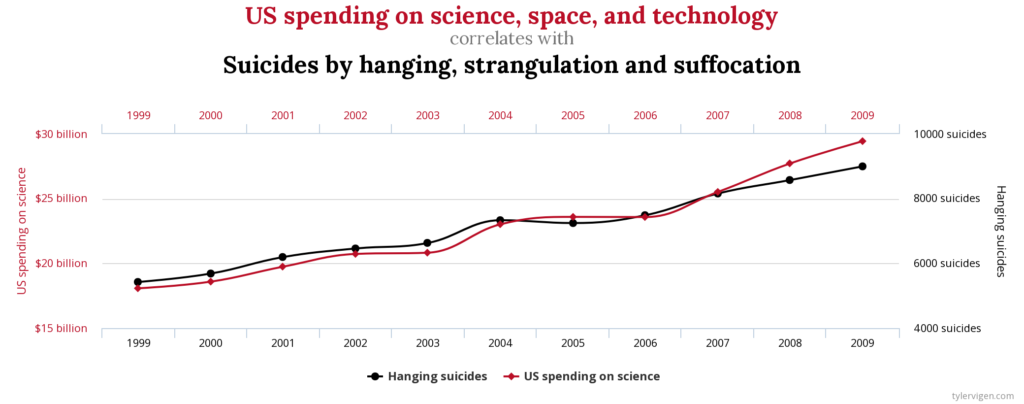
Vegetarians tend to shop at health food stores, do yoga, don’t drink as much as meat eaters, and generally have a healthier lifestyle than someone on a typical Western diet. When all of these lifestyle factors are accounted for, a recent, very large study found “no significant difference in all-cause mortality for vegetarians versus non-vegetarians.” In fact, this study concluded, “a vegetarian diet is associated with poorer health (higher incidences of cancer, allergies, and mental health disorders), a higher need for health care, and poorer quality of life.”
The link between bacon/processed meats and colon cancer is also completely overblown. The odds of developing colon cancer from eating processed meats are statistically insignificant. The risk of developing cancer from eating about 2 pieces of bacon per day is 18%, which sounds high, but really when you consider the average risk of developing colon cancer is 5%, eating bacon would only increase your risk to 6%. That’s a lot different than smoking cigarettes, which raises your risk of cancer by 2360%.
2. We Need MORE Protein
The EAT Lancet report says that 0.8g/kg of bodyweight, or about 10% of overall calories is “adequate” for protein intake, but that children and older people may require more and also acknowledges that animal sources are the best source of protein.
The truth is, 0.8g/kg is the minimum, not the optimal amount for most people. As the most satiating macronutrient, protein from animals is the lowest calorie way to fill up and get the majority of your micronutrients. Many studies have shown that anyone who is growing, metabolically broken (that’s half of Americans), highly stressed, wanting to lose weight, wanting to gain muscle, recovering from illness or is over 40 years old, probably does better with at least double the RDA of protein, about 20% of overall calories or 1.6g/kg. I wrote a long post about protein requirements here and the New York Times also has an article saying everyone over 40 should get twice the RDA of protein.
Given that most of our population is metabolically broken, and the researchers recognize that there are metabolic benefits to increased protein intake, yet we’re also trying to reduce overall caloric intake, it would make a lot of sense to recommend more animal protein instead of beans and nuts. Trying to get your protein from beans and nuts means you’ll have to eat a ton of calories and extra carbohydrates to get it.
3. Animal Protein is Superior to Legumes and Nuts
As omnivores, our bodies were meant to digest animal fats and proteins, and we naturally produce acids and bile to break down protein quite easily. Protein provides the building blocks of our bodies, and animal sources are the most complete protein sources because they contain all of the amino acids we need for optimal health. The heme iron in steak is the best, most bioavailable source of iron, and a small 4oz serving of beef contains 95% of the DRI for B12, something you can’t get from plants.
Iron and B12 are two of the most common nutrient deficiencies worldwide according to the CDC. B12 deficiency in particular can cause permanent brain damage to developing infants and is most common in vegetarians and vegans. The diet recommended by EAT Lancet does not provide enough B12 and requires supplementation. In fact, most of the vitamins and minerals we need are best found, and best absorbed from animal sources, not from plants. How nutritious, environmentally friendly, or ethical is it to advise a nutrient deficient diet to the global population?
Let’s compare 4oz of cooked kidney beans to 4oz of a cooked sirloin steak…


To get the same amount of protein in a 4oz steak (181 calories) you’d need to eat 12 oz of kidney beans (almost one pound!) plus a cup of rice, which equals 638 calories, and 122g of carbs. Imagine trying to get 100g of protein from this sort of diet!
Since most of us aren’t looking to eat MORE calories or excess carbohydrates, beef is the clear winner. Fish, shellfish and other animal proteins are also superior to beans in terms of calories, vitamins and minerals. And speaking of methane emissions, beans don’t necessarily have the reputation as the most easily digested food (ahem, the magical fruit?). Excessive flatulence is not only uncomfortable, it’s embarrassing!
What about nuts? To get the 30g of protein from almonds, you would need to consume a little over 1 cup of chopped almonds, which is over 850 calories and 75g of fat. YIKES!
4. Dairy Can Be a Problem for More Than Half of the World
The EAT Lancet recommendation to consume 9 oz of milk (or “dairy equivalents”, which would mean about 2oz of cheese) daily is inappropriate for a global dietary recommendation. Approximately 65% of the population experiencing some form of lactose intolerance. In certain ethnicities, up to 90% of adults have issues with milk. It can cause hormonal and digestive disturbances, acne, and weight gain for some.
While I feel that meat is a much more vital as a food source than milk, I do believe that full fat, grass-fed (and especially fermented) dairy is certainly a nutrient dense food, and can be produced in a regenerative way. However, guidelines saying that we consume more dairy than meat are not based on sound evidence. More on meat vs. milk here.
5. Reducing Animal Consumption Will Increase Nutrient Deficiencies
Red meat is important to the global human diet and “its contribution of protein and key micronutrients is under-appreciated.” A recent study looked at what might happen if the entire US eliminated animal products from our diet. Overall calories would go up (we’re already having an issue with overconsumption of calories) and nutrient deficiencies would also increase. And what about all of our greenhouse gas (GHG) emissions? Overall emissions would be reduced by a mere 2.6%. It turns out, eliminating animals would “create a food supply incapable of supporting the US population’s nutritional requirements.”
Iron deficiency is the most common nutrient deficiency and is most prevalent in women of childbearing age and children. In children, it can cause developmental delays and behavioral issues. Vegetarians are commonly iron deficient, which is a risk factor for type 2 diabetes. Heme iron, found in red meat, is the most absorbable kind of iron, two to three times better than plant-based iron, and absorption is also dependent on current iron stores. In New Zealand, hospitalizations for iron deficiency have doubled over the last 10 years as red meat consumption has declined. Vegetarianism in New Zealand is up nearly 30%, and of those who do eat meat, they’re eating more than twice as much chicken and pork, yet beef and lamb consumption are dramatically down.
Early signs of iron deficiency include fatigue, light headedness, and shortness of breath. In children, iron deficiency is quite serious and can cause failure to thrive. After reviewing the various foods recommended in the EAT Lancet diet, I can’t figure out how someone could get adequate iron without fortification or supplements, especially given that soy and components in beans, like phytic acid, can inhibit iron absorption.
Getting adequate vitamin A is another problem with the prescribed diet from EAT Lancet. Plant foods contain an inactive form of vitamin A called beta-carotene. The conversion into active vitamin A is pretty inefficient. Almost half of the population have a gene that reduces the conversion of beta-carotine to vitamin A by approximately 70%.
I also don’t see how this diet meets the calcium requirements. The calcium found in plant foods is not as bioavailable as calcium from foods like dairy and sardines. Low calcium, together with vitamin D (another nutrient low in vegan diets) is a very big concern for bone health. Fracture rates are 30% higher in vegans than in those who consume animal products.
Research shows that expecting mothers who don’t eat meat are more likely to experience premature delivery and low birth weight newborns. Other nutrients of concern for those on meat-free diets include glycine, selenium, methionine, taurine, creatine, choline, and iodine. Iodine deficiency can lead to brain damage and irreversible mental retardation. Among the most concerning nutrient deficiencies shown in the vegetarian and vegan population is vitamin B12. A deficiency in B12 can cause depression, psychosis and cognitive impairment. Plant foods like seaweed, brewer’s yeast and fermented soy contain B12 analogs and not the true form of B12. These analogs actually increase your need for the true form of B12.
In developing countries where malnutrition is still a very real problem, reducing meat to this tiny level will have serious consequences. When people don’t have access to supplements or highly processed and expensive veggie burgers, and their land is only suited to grazing animals, eliminating the majority of their nutrient dense food to replace it with grains and nuts from far away is not a sustainable, healthy or ethical solution.
Another post that does a great job of pointing out exactly how the EAT Lancet diet will not meet basic nutrient needs for a human can be found on Zoe Harcombe’s site, and my friend Marty Kendall wrote this excellent critique looking at the poor nutrient density of the EAT Lancet diet, showing that it’s even worse than the current US Dietary Guidelines.
6. Our Food System is Not Producing Enough Fruits and Vegetables
A recent study found that if everyone ate Harvard’s guidelines for recommended fruits, vegetables and proteins, we wouldn’t have enough of them.
“Results show that the global system currently overproduces grains, fats and sugars, while production of fruits and vegetables and, to a smaller degree, protein is not sufficient to meet the nutritional needs of the current population.”
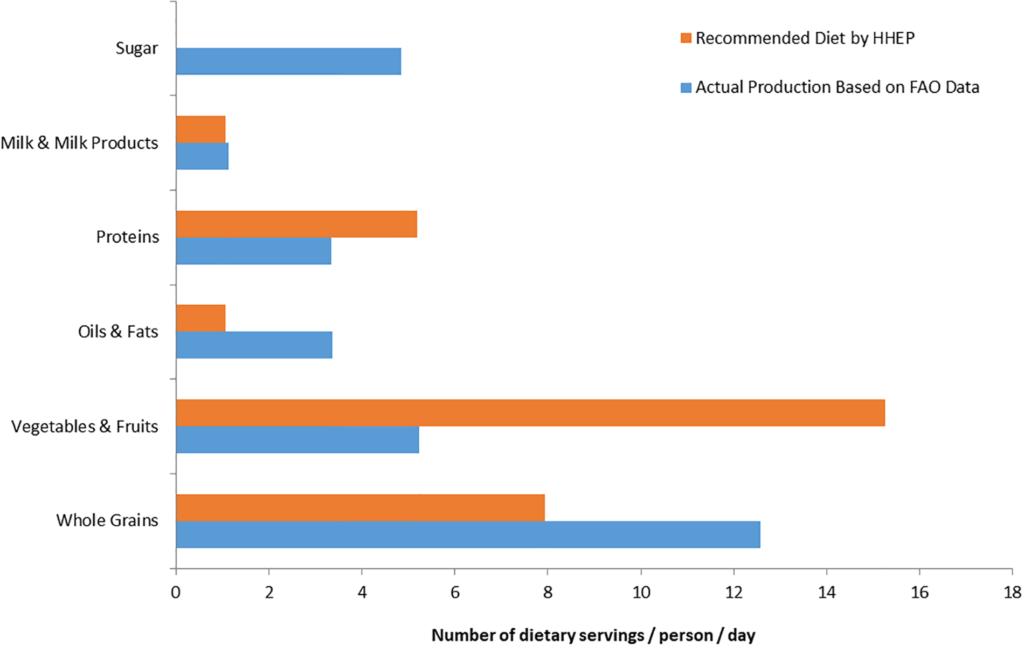
We’d also have more food waste in this new diet scenario, not less. Cereals, fruit and vegetables make up the largest majority of food waste right now, not meat. Let’s face it, we’re really great at producing human “feed” – nutrient poor and shelf stable sugar, grains, and industrial seed oils that cause diabetes and inflammation.
7. Beef is a Protein Contributor to the Food System
Because 90% of what cattle consume is not edible by humans, and because they graze on land that can’t be cropped, cattle actually generate more protein to the food supply than would exist without them. I speak more about this in the environmental sections below, but ruminant animals like cattle actually expand the capabilities of our usable land by converting food we can’t eat on land we can’t crop into protein. They actually “upcycle”nutrient poor food into nutrient dense food. If we need to feed a growing population, we need to utilize brittle, rocky, steep areas that can’t grow crops like corn. If we don’t graze it with edible animals, we lose the capacity to use that land for food, and the land suffers, too! Contrary to the mainstream dialogue, eliminating beef will not “free up” tons of extra food for fighting hunger.
[Tweet “90% of what cattle consume is not edible to humans #yes2meat”]
8. Ultra-Processed Food is the Problem!
If we want to blame a dietary category, it’s certainly not red meat, as our consumption (less than 2oz per day in the US) is less than it was in 1970. What we are consuming more of is refined oils and highly processed grains. Perhaps that’s what we should be focusing on?

What we need for people, especially those who are overweight or have metabolic syndrome/type 2 diabetes, is protein that has fewer calories and carbohydrates, so basically, this is the exact opposite of wheat, corn, beans and rice. The best source of protein is animals. Animal flesh is a more nutrient-dense, bioavailable, complete protein and happens to have fewer calories per gram than plants. Read more on that here.
9. Not All Agricultural Land Can Be Cropped
EAT Lancet seems to ignore the fact that not all land can be cultivated for crops. Just because you remove animals, doesn’t mean you can just go grow some lentils or kale there. More than 40 percent of the land in the contiguous U.S. is pasture and rangeland that is too rocky, steep, and/or arid to support cultivated agriculture – yet this land can support cattle and protein upcycling. Ninety percent of what cattle eat is forage and plant leftovers that people can’t eat. While industrially-raised chicken does eat primarily grains grown on cropland, 85% of the cattle raised for beef graze land that can’t be used for growing crops.
10. Cattle Can Graze Crop Residue
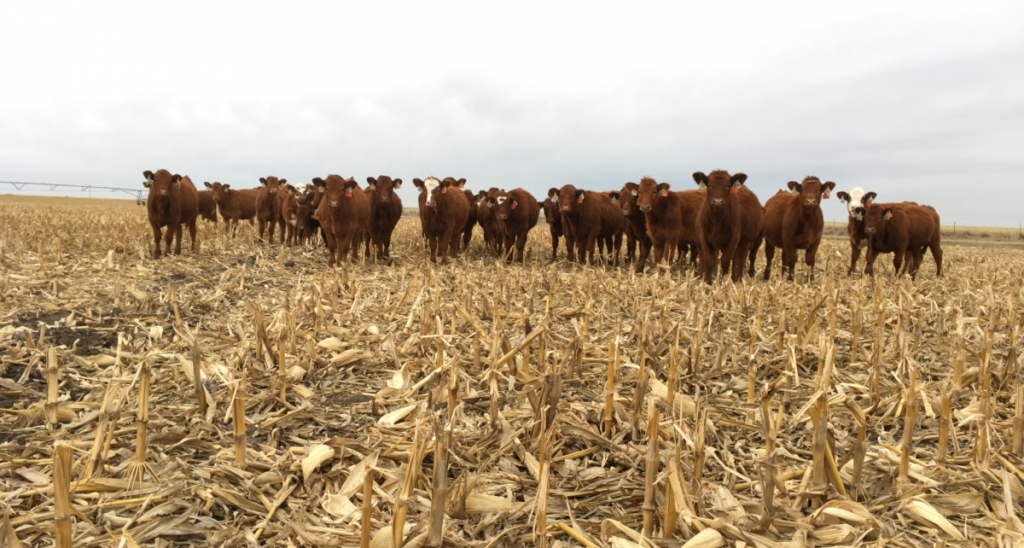
What other miracle food can covert “food waste” into protein while depositing fertilizer? If this field wasn’t grazed, the cornstalks would emit greenhouse gasses as they decompose anyway. Cattle ranchers are also grazing harvested wheat fields and other crops. Ranchers are also using another technique grazing cattle and goats among edible fruit and nut trees, called silvopasture. On the farm where I live, sheep love cleaning up our broccoli fields, converting broccoli stalks into meat and wool. Pigs do very well grazing apple orchards and converting fallen apples that would normally be considered waste into bacon. The animals can keep the weeds and brush down, improve the fertility and water holding capacity of the soil, AND produce meat while not taking up “extra space”.
11. Methane Claims Against Cattle are Overblown
The methane emissions arguments commonly cited against beef are also overblown. According to the U.S. Environmental Protection Agency, greenhouse gas from beef cattle only represents 2% of emissions in U.S. By contrast, transportation accounts for 27% of emissions in the U.S., representing a far more impactful opportunity for reducing greenhouse gas emissions. I just released a podcast with Frank Mitloehner, an expert in greenhouse gas emissions in animal agriculture, who explains what the real problem is in terms of greenhouse gas emissions, and why methane emissions from cattle are exaggerated. Plus, he weighs in on how ruminant animals upcycle nutrients.
12. Well-Managed Cattle Can SEQUESTER Carbon
Cattle, when managed well, can actually be part of the climate SOLUTION. A new study has just come out from Michigan State: Impacts of soil carbon sequestration on life cycle greenhouse gas emissions in Midwestern USA beef finishing systems was published in Agricultural Systems. The researchers tracked carbon sequestration over four years. And although the feedlot system produced less emissions (in terms of cow farts,) when looking at the entire lifecycle system, well-managed cattle on grass (moved to new pasture frequently) produced a net carbon SINK. The emissions were completely offset by the amount of carbon sequestered in the ground. And not just a little bit of carbon, it was a significant amount.
13. Grazing Ruminants Improve Biodiversity, and Other Ecological Markers
Cattle grazing on land we can’t farm, producing high quality protein and micronutrients from food we can’t eat seems like a win to me. Also, well-managed cattle can improve the water-holding capacity of the land, which makes rainfall more effective and they increase biodiversity. Why is that important? Because the more diverse an ecosystem is, the more resilient it is. We need more variety, not less. If we instead plow up every inch of space possible to plant vast fields of one crop using chemicals to annihilate all insects and weeds, we will further deteriorate our soil health. A food system without animals is simply unhealthy and unsustainable and the opposite of the direction we should be going in. We need more regenerative farming, and this includes grazing animals.
14. A Meat Tax is a Bad Idea
Furthermore, a meat tax, as I’m sure the experts are aware, is simply a tax on the poor. This past weekend I had to run to the store and took a quick photo of the items on the belt in front of my order. This customer had soda, cookies, cupcakes, donuts, some deli meat and bacon. As a dietitian, the MOST healthy items in her cart by far are the bacon and deli meat. Let’s be real about what’s causing our obesity and diabetes epidemic.
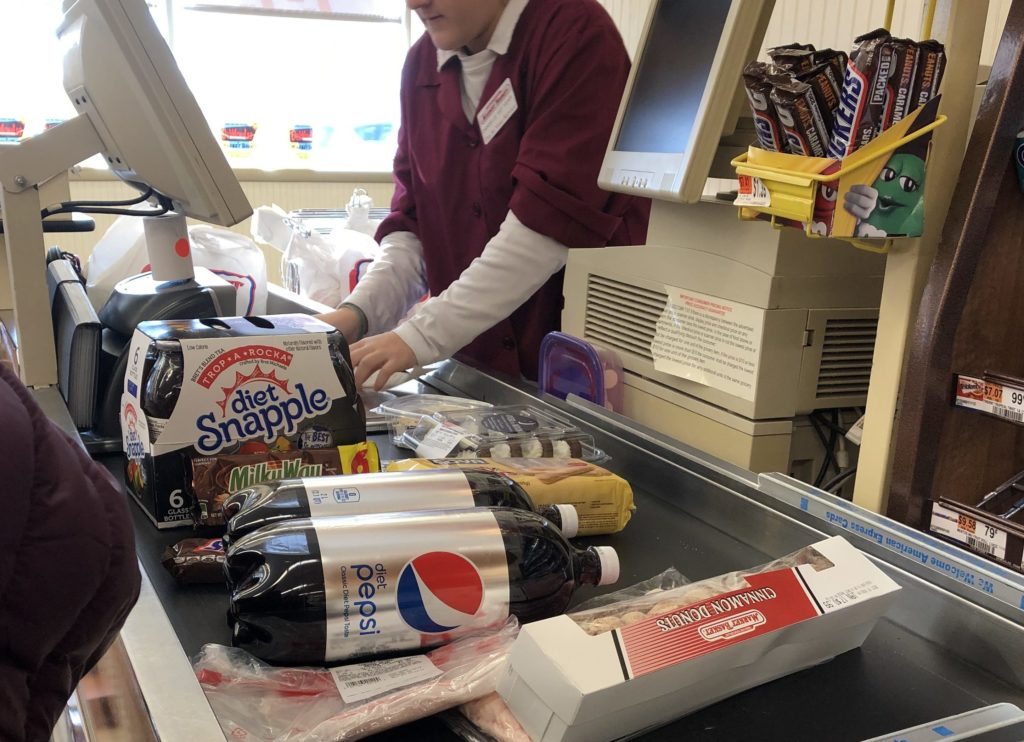
Do you think this person is going to switch to a whole foods, unprocessed grains and tofu plus palm oil diet anytime soon? Can she even cook or have access to a stove? Does she know what this food is doing to her? Is longevity at the top of her priority list, or perhaps do you think she might have other problems that are taking a front seat to better health?
Most people buy processed meat because it’s cheaper and easier to prepare than fresh meat. For those with limited income and who are food insecure, a tax on processed meats will not mean that they will spend more on fresh meat, it will mean that their grocery dollars will simply be spent on more ultra-processed foods. Cheap, nutrient poor food tastes really good. It’s addictive, and it’s accessible. When there are really smart people working in labs to make sure “you can’t eat just one,” it can be quite a challenge to turn eating habits around, especially when better health is not on the top of their to-do list.
Instead of penalizing those who are making bad food choices, why not start at the source? How about eliminating subsidies that encourage the production of cheap, nutrient-poor food instead?
15. Many People Depend on Livestock
In her book, Defending Beef, Nicolette Hahn Niman also points out the very important concept that domestic animals are of huge nutritional and food security importance in developing countries. Many poor people depend on livestock, and eliminating animals from the food system would actually increase hunger and poverty, leading to more people relying on the government for food assistance. Nicolette writes, “In contrast with crop farming, which produces sporadic, seasonal, perishable products, livestock is an asset that can be maintained for short or long periods of time then quickly converted to food or cash when needed.”
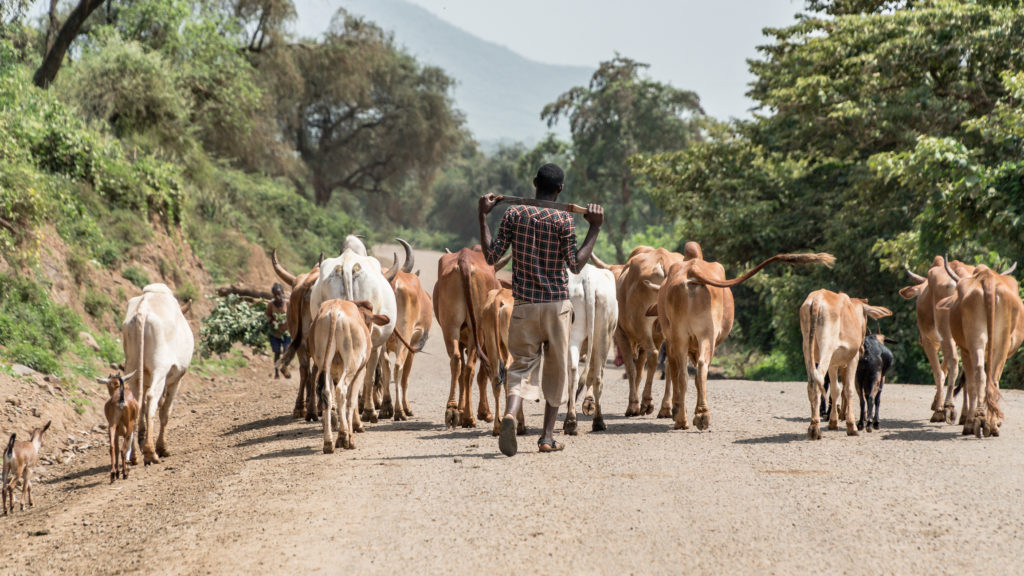
Since crop farming requires good soil with few rocks, access to steady rainfall or irrigation, and can only be harvested at a specific time, it’s a much less secure source of food. Animals are also mobile, think about how important that is to someone who doesn’t have the money to own land. They also require less attention and resources than cropping, and can multiply on their own (no need to buy seeds from Monsanto!).
[Tweet “Livestock are food security for many in developing countries #yes2meat”]
16. We Have No Right Forcing People to Eat “Our” Way
No matter what your individual dietary philosophy, you can’t legislate that people eat a certain way. First of all, this just won’t work. People are going to eat what they want to eat. Processed food tastes good and a lot of people just will not give it up.
I also think it’s unethical to force people to eat a diet that relies on foods not from that region and that are not culturally appropriate. The idea that a group of privileged, wealthy, white, thin people can come up with one global dietary solution is insane. Below is a perfect example of how wrong we’ve gotten everything:
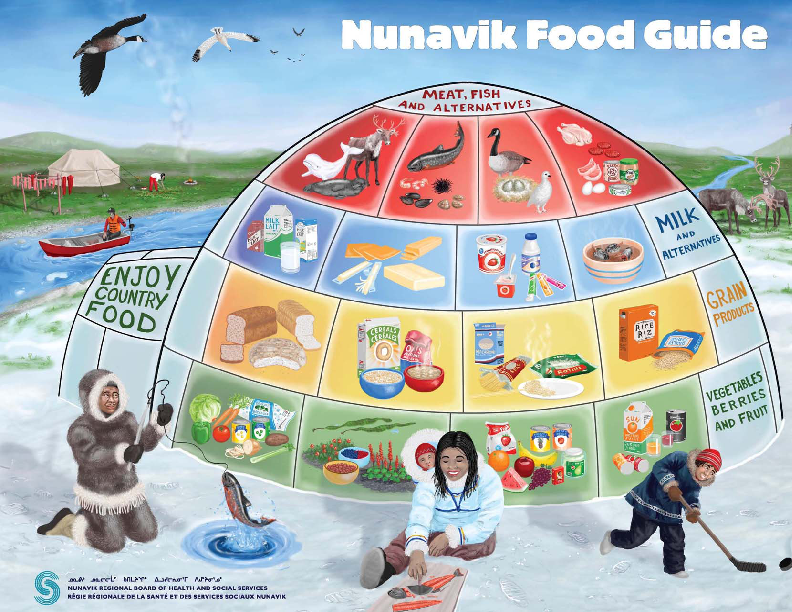
Should we be telling the Nunavik, a population that has traditionally relied on wild meats (not bananas) that their traditional foods are in the “red” category and will cause heart disease because they’re too high in saturated fats? Instead, the encouraged foods are bananas, orange juice, watermelon and 6-8 servings of grains like bread, rice and processed cereals. How is this ok?
I recently had an exchange with a vegan on my instagram page insisting that the proposed law forcing restaurants in Los Angeles to serve vegan entrees was a good idea. She actually thinks that she is entitled to require by law, private businesses to cater to her dietary preferences. She argued that being vegan was much more serious than an anaphylactic nut allergy, and a law is the only way to make sure she can find animal-free food when eating out. How is this level of egocentrism ok? I personally have celiac disease and do not expect restaurants to cater to me – if they do, great, but I don’t feel it’s ethical to force them by law to cater to my restrictions. There are people out there who will die when exposed to certain foods, yet there are no laws requiring restaurants to cater to nut free, gluten free, or any other special diets. Why should those on a vegan diet get a special law? I’m totally fine if someone personally chooses to eat a certain way, but to demand others to accommodate by law is definitely not ok.
The EAT Lancet dietary recommendations effectively are pushing a meat-phobic dietary ideology on the globe, and are trying to make these ideas (based on very shaky science) enforceable by government policies.
17. Not Everyone Has Access to Local Fresh Produce, Which Often Has Higher Emissions than Meat
Fresh produce is not grown year round in all locations, not available to everyone, and by calorie, weight, and micronutrients, more expensive than meat. Oh, and lettuce has three times the GHG emissions of bacon and fruit has the largest water and energy footprint per calorie. I didn’t see this mentioned in the EAT Lancet report.
18. There Are Other Ways to Improve Your Diet
The truth is that we don’t know that much about nutrition and certainly should never be setting global dietary policy based on epidemiology (the studies that can only show associations and not prove cause). Why not take into account food traditions that communities have thrived on for centuries, climate-appropriateness of a region being able to produce and store that food?
Given how little we understand about human nutrition, and that processed foods are generally nutrient-poor and not what humans evolved eating, how about just starting there, by encouraging folks to cook at home and generally eat less ultra-processed foods?
How about adopting a general guideline similar to Brazil’s Guidelines:
1. Make natural or minimally processed foods the basis of your diet
2. Use oils, fats, salt, and sugar in small amounts when seasoning and cooking
3. Limit consumption of processed foods (meaning bread or canned fruits vs. fresh fruits)
4. Avoid consumption of ultra-processed foods (meaning sugar sweetened beverages, candy, chips, etc.)
5. Eat regularly and carefully in appropriate environments and, whenever possible, in company
6. Shop in places that offer a variety of natural or minimally processed foods
7. Develop, exercise and share cooking skills
8. Plan your time to make food and eating important in your life
9. Out of home, prefer places that serve freshly made meals
10. Be wary of food advertising and marketing
Many different diets that are radically different to the EAT Lancet global diet recommendations are reversing diseases like type 2 diabetes. Clinical trials have shown remission from diabetes on a high fat, moderate protein, low carb (ketogenic) diet that includes much more animal products than the diet EAT Lancet recommends. While I don’t feel the ketogenic diet needs to be THE global dietary solution, the Virta trial certainly shows that there shouldn’t be only one diet for all people, and that we should be thinking outside of the box and nutritional epidemiology if we’re going to solve our type 2 diabetes crisis. Traditionally, humans have lived a very healthy life on a wide variety of macronutrient ratios and it seems clear that once modern, ultra-processed foods enters the picture, the wheels fall off.
19. There Are More Effective Ways to Reduce Your Carbon Footprint
And what are the things individuals can do to reduce their carbon footprint? According to a recent meta-analysis, having one less child (in industrialized nations), which was shown by far to have the biggest impact, followed by living “car-free”, avoiding one round-trip trans-Atlantic flight, and buying “green” energy have much more of an effect on our carbon footprint than our dietary choices.
20. Red Meat Has Unfairly Become the Scapegoat
Frédéric Leroy believes that red meat is a convenient scapegoat, absorbing our stress about climate change and our failing health, and I completely agree. There is no one perfect human diet for all health conditions and ecological regions, and to prescribe one for the entire globe is ridiculous. Its time to look at the evidence we do have, admit what we don’t know, and stop targeting meat as the cause of global warming and modern disease. We clearly have problems with our food production system (both in the way we crop and in our industrial meat production system). With less than 60 years of farming left at our current rate of soil degradation, focusing on our soil health (which includes the use of well-managed animals) is critical. Working on fixing HOW we produce food would be much more effective than focusing on WHAT we’re producing.
[Tweet “Red meat has been wrongfully vilified as unhealthy and bad for the environment #yes2meat”]
Sadly, there are few people pushing back against this anti-meat campaign. If you appreciated this blog post, please sign up for my newsletter (I’ll send you a free meat cookbook with a $25 coupon for grass-fed beef!)
Help Me Fight Back!
Donate to my film project “Sacred Cow” defending the nutritional, environmental and ethical case for better meat. The “other side” of meat needs to get out there, and I need your help. Thank you.


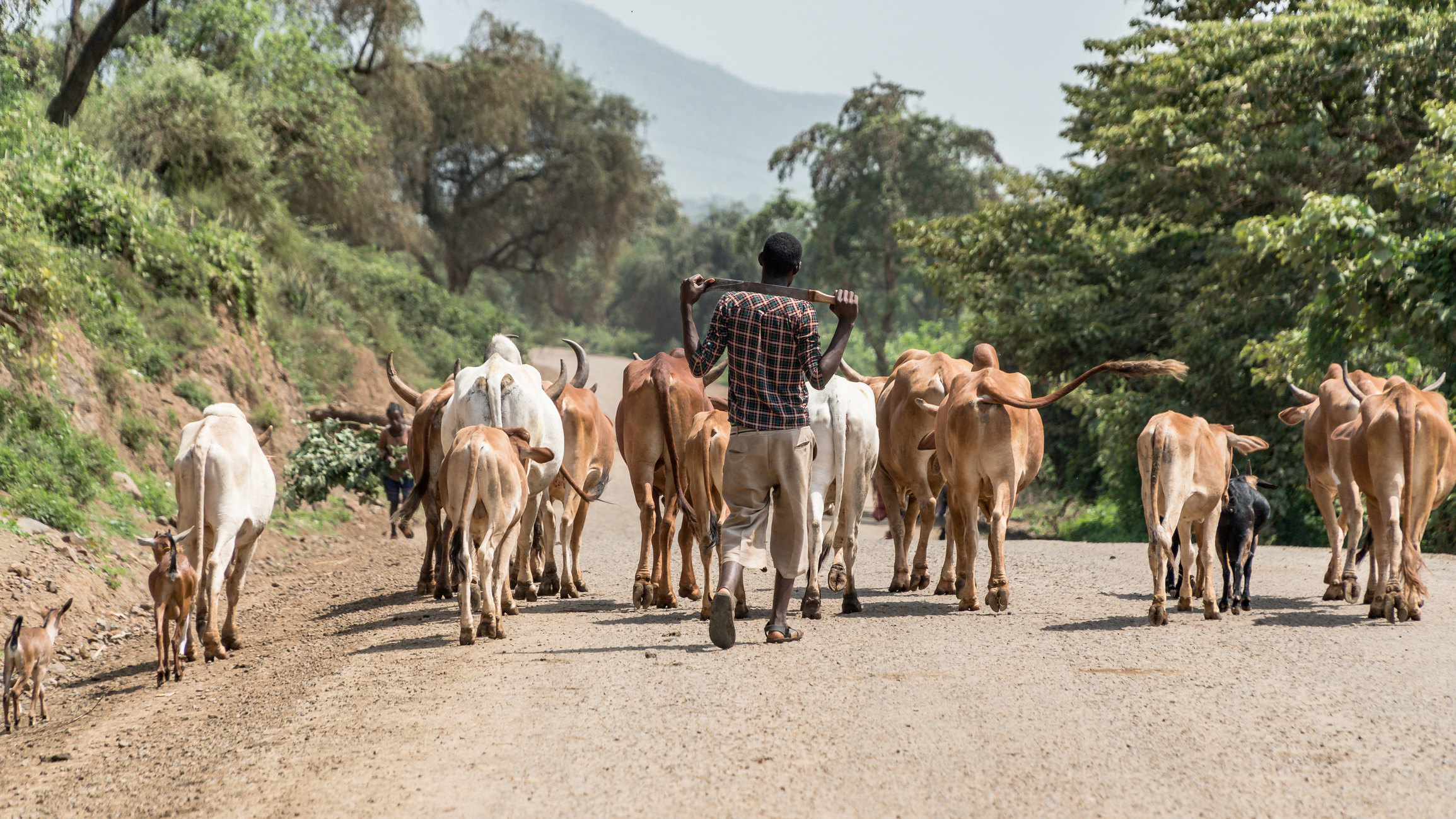
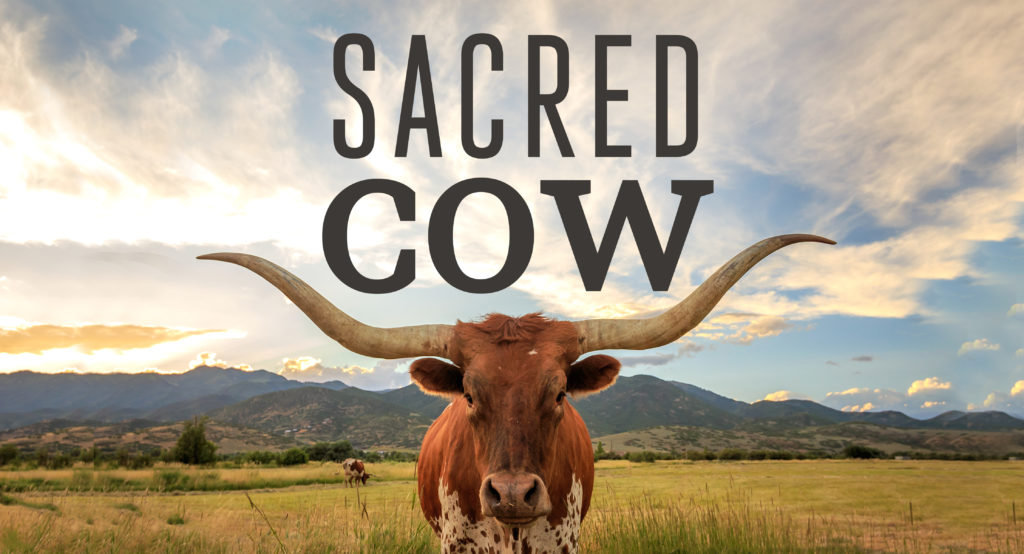






63 thoughts on “20 Ways EAT Lancet’s Global Diet is Wrongfully Vilifying Meat”
Thanks for writing this great, informative blog. It provides some balance for all the insane accusations against red meat and animal agriculture in general.
There is some sensible advise but it is unfortunately not balanced at all. it is a polemic in favour of meat.
Why for example does it advise against processed meat products?
There is very good evidence that these (ie sausages, bacon etc) are carcinogenic .. that doesn’t mean you WILL get cancer just that the odds increase … think HRT or tobacco use)
There is no question at all that red meat has a far higher environmental footprint than food crops (generally – about 10x)
That includes freshwater use, methane and CO2 emissions .. (and antibiotic use – which could more easily be curtailed).
We kill over 70 billion animals a year for human consumption and use and an area the size of Africa is used for livestock .. this is clearly unsustainable. To pretend otherwise is equivalent to thinking we can keep using 90 million barrels of oil a day or dumping millions of tons of plastic waste into our oceans without consequence.
It’s always a good idea to read the post before commenting. Thanks.
Mr. George Crisp, Please read these two books – Cows Save The Planet and Water In Plain Sight by Judith Schwartz to get a better understanding of how nature works. The biggest contributor to green house gases is the bare land tilled after harvest by crop farmers each year as this allows CO2 to escape into the atmosphere rather than being kept in the soil where it should be. Modern farming has reduce the humus “carbon” in the soil by tillage and exposing the land to wind and water erosion which is polluting our water sources. The soil is a living organism that needs to be better managed through out the world. Check out what Allan Savory has learned over his lifetime about managing the land through holistic approaches. Humans have to have nutrients from meat sources that are NOT provided by grains, legumes, or other plant sources. The food chain starts in the soil and is a complex relationship with plants that provide nutrients for animals that provide nutrients for humans and each level makes or processes nutrients for the next one and when for example humans by pas s the animal level and only use plants as their nutrition source, nutrients are missed because they are not in plants but made in animals. I do hope you read these books. Blessings
Thanks for your patient response.
Did you miss the part about how food animals can graze unfarmable land? Sigh. And when I raise poultry or lambs, they need ZERO antibiotics, because they are moved constantly to fresh grass outside under fresh outside air. The WAY meat is produced is essential to be educated on this issue. Feedlots are the equivalent of acres of GMO Roundup-sprayed corn.
He didn’t even read the article. He got triggered because people are actually using logic instead of swallowing the lancet and “meat bad” nonsense without question.
Superb piece!! More work needed to inform those naive and far removed from food production of the food fraud being waged against animal based products
Preach …!!
Very enjoyable to see the reasonable.
I am wondering if I just missed you somehow; considering I do follow Frederic and Frank and many interwoven accounts that interact with each other.
To say I have a strong interest in what you are writing about is understatement.
I do a fair amount of research writing in the cattle industry.
And personally believe that a higher protein, high vegetable, moderate fruit and moderate dairy is my health prescription to continue to avoid RX and doctor visits.
[And physical work is my secret weapon]
*Check paragraph #17, you have a compare to vegetables that is a mistake
Thanks for the comment and for catching that typo! Fixed! – Diana
Dissapointing to find dairy farmers getting thrown under the bus from both sides. “Can cause weight gain”…? What kind of dairy are you talking about–low fat ultrapasteurized milk? What studies on dairy showing clear causation from the inherent properties of unprocessed milk are being cited here? And if highly processed low fat dairy is the real problem, let’s make that clear, instead of making milk products in general sound like acne-causing, obesity-inducing garbage.
What about pastured raw milk, or the incredible nutrition in butter, or the benefits to gut health from yogurt and kefir? It would have been better to skip over the dairy part entirely rather than adding to the popular smear campaign that it suffers under. To denegrate it in this way hurts regenerative pastured dairy farmers just as much as it hurts conventional producers. Indeed, it may hurt consumers who could benefit from the nutrition in quality dairy products but skip them based on the assumptions espoused here.
Many indigenous cultures of the world rely on dairy as a critical part of their diet (Mongolian, Masaai, traditional European, Hindu, etc). It would make sense to address the issue more kindly, simply noting that not all people groups can digest dairy, and skipping the undifferentiated dairy-bashing. It would also make the post more cohesive to skip the dairy negativity, since dairy fats are a traditional animal fat that provides important nutrients lacking in the vegan diet.
Adults who are looking to lose weight should not be drinking milk in my opinion as a dietitian. I prefer cheese and butter to milk actually, if tolerated. Not everyone wants to lose weight, so I’m not saying that milk is “bad”. This was not “dairy bashing” at all. I am not against fat. Please read some of my other posts where I promote fermented dairy as a health food. I had a lot of points to get across so not all of the nuance can be said in one blog post with 20 points.
Hi- thanks for all your work on this. I do agree with Melissa though, you do come across as extremely negative toward milk on this post, and very unnecessarily so. Certainly there are people who don’t tolerate it well, though it’s now well understood that this is a much overblown issue. People should be encouraged to try A2 milk, and/or raw milk, not to just give up on such an important dietary element- and you also need to look harder at this issue if you are suggesting that people are better off without fluid milk. For one thing, it truly is hard to get enough calcium and protein without milk in the diet. For another, milk is of great importance as being an important way of translating solar energy into human food in the very fastest way- and for regenerative agriculture to work that is essential. So please take a harder look at milk, and not just fermented milk. Thank you
I’m a dietitian and help people lose weight often, and milk is not helpful for weight loss in my opinion. I’m allowed to have a clinical opinion as a dietitian. It doesn’t matter if it’s raw milk or A2 milk, it is not a superior source of protein to animal flesh. That’s just science. It’s also not the best way to get calcium. It’s just not. I’m not saying it’s unhealthy to drink milk.
HI, actually you did say it was unhealthy to drink milk, that’s why I can’t let this go. I’m sorry to feel like I’m niggling a point in an otherwise very solid piece of work. Again, milk is the very fastest, most sustainable way to turn grass and other vegetation into a form that humans can use- which ultimately is the point. Of course meat is a more concentrated source of protein, but after you harvest it the animal isn’t going to be making more, consequently is less helpful especially in the developing world. I don’t know what you mean by suggesting that milk isn’t the best source of calcium- certainly there’s cheese, but for most people the simplest solution is the best, and especially for children (and anyhow some of the calcium and a lot of other nutrients are lost in the whey when making cheese).
As an aside, I see I got my mother’s name wrong. As a writer her name is Joann Grohman; she’s the author of ‘Born to Love’, ‘Keeping a Family Cow’, and ‘Real Food’, as well as numerous articles.
Actually, I did not say that milk is unhealthy. I said this: The EAT Lancet recommendation to consume 9 oz of milk (or “dairy equivalents”, which would mean about 2oz of cheese) daily is inappropriate for a global dietary recommendation. Dairy is problematic for most humans, with approximately 65% of the population experiencing some form of lactose intolerance. In certain ethnicities, up to 90% of adults have issues with milk. It can cause hormonal and digestive disturbances, acne, and weight gain.
Like most foods, I don’t think milk is black and white, good or bad. Sardines are a better source of calcium than milk, as are many other foods. When I worked in a hospital with patients who needed to gain weight, we gave them milk if they tolerated it. I think in some developing countries where folks are looking to get nourishment from an animal, milk can be helpful. Clearly though, the science shows that it’s not the best source of protein and more people are lactose intolerant than can digest it, so I don’t feel it’s appropriate to mandate all humans drink milk. Plus, most Americans are overweight or obese. Drinking milk will not improve this situation. For what it’s worth, I give my kids milk. They are rapidly growing, seem to like and tolerate it, and it contains great micronutrients. I’m not looking to gain weight (like most people) and get plenty of calcium from other sources. Again, I NEVER said it was unhealthy. I think the goal is to eat as many foods that don’t give you issues as possible. For most, milk causes issues.
As a integrative and functional RDN, I too think of dairy as a grow food, meaning that it helps tissues grow…. there are many issues surrounding dairy and the fact that most of the worlds population is intolerant should be taken into account when making global recommendations. To the people commenting your points are clear but please remember that your personal experience does not necessarily translate to that of everyone. Some people can thrive and heal with dairy but not most. Nutrition advise should be individualized and we should all resist the urge to further polarize an already heavily polarized subject matter. Great article and good dialogue. ????
I looked everywhere and couldn’t find where they got any people to actually try to eat the EAT-Lancet Diet and what health effects it had. I doubt that there would be 34% less early deaths because I would expect a big weight gain in anyone eating all the grain. Did I miss any trial of this diet?
Thank you so much Diana, it needed to be said! Keep up the great work!
Fantastic response, Diana!
I’ve pinned it as an announcement on SUGARbriety Facebook. Share this far and wide, folks. The vegan agenda to make the whole world go vegan by 2050 is now revealed in all of its incredible insanity. The “science” in EAT-Lancet would fill a thimble. The wrong-headed assumptions and glaring omissions would fill a concert hall.
All of humanity adopting EAT-Lancet’s absurd “universal healthy reference diet” would be a catastrophe for both human AND planetary health. With half of all adults either insulin resistant or diabetic worldwide, this diet is a recipe for a globe FULL of diabetics which is a future of pain and suffering of biblical proportions.
Tell your friends, tell your family, tell your elected officials. Just say NO to EAT-Lancet. The health of our loved ones and the health of our planet depend on it.
Thank you for writing this. I got goosebumps. So well spoken.
Thanks so much!
Pingback: [BLOCKED BY STBV] Are you confused, too? – Harnessing Your Health
Hi
I have an MSc in Human Nutrition and to be honest I find this Lancet study extremely frightening on many levels. You have provided an excellent assement which I am in complete agreement. Dr Zoë Harcombe has also provided an excellent breakdown of the micronutrient bases of this diet and has shown it to be significantly deficient on many levels, My studies specialised in using a ketobased diet for reducing chronic pain…and without meaning to plug my own work I am currently working on a book aimed for both GPs and Patients to use in order for them to reduce the pro-inflammatory nature of their current diets. This Lancet diet is almost completely opposite to what my own studies etc have shown to assist in dealing with the huge problem of chronic pain. I just believe that some like Willet with his obvious biase is allowed to head such a potentially influencing diet reccomendation – indeed a repeat of Ancel Keyes and the lipid-heart hypothesis springs to mind and look how much damage that unproven hypothesis has done over the last 50 yrs.
Pingback: [BLOCKED BY STBV] Report: Cut red-meat eating by 80 percent to save the planet?
I started reading this last night before bed, thru a link thru Marks Daily Apple (YAYYY) – I was so flabbergasted I marked it unread and came back to it today. Thank you for this in depth assessment.
It seemed like a step in right direction with a revision of the pyramid and my plate nonsense, but ended up being even worse than I ever thought.
People need to take ownership of their health and in a lot of populations can’t, if this is nonsense they see.
My Plate is still alive and strong. This new recommendation is not a USDA program, it’s independent.
This podcast may interest you.. Its with Dr. Mark Hyman and Paul Hawken. Paul is an environmentalist, entrepreneur, author, and activist who has dedicated his life to environmental sustainability and changing the relationship between business and the environment. Paul is Executive Director of Project Drawdown, a non-profit dedicated to researching when and how global warming can be reversed. He is on a mission to present real, already existing solutions to reverse global warming. In this podcast, they discuss that global warming can be reversed by changing our food system. On the other hand, changing the amount you drive or changing to “car free” only slows down globing warming. Therefore, there is a greater effect to change our food system…. meat being the biggest component. So yes, the focus is more on the HOW then WHAT.
Link to the podcast: https://www.youtube.com/watch?v=UkWoi4GYrMM
I know Mark – he’s awesome – and have read Paul’s book and he is still not acknowledging the huge benefit animals can have on carbon sequestration. Paul sadly is still in the “eat less meat” camp, which doesn’t account for the nutritional importance of meat. And although Mark Hyman promotes meat “as a condiment” in his recent book he says to eat 4-6oz of meat per day. This is not a condiment.
Thank you for this great post. I am going to follow all of the links – it is really helpful to have all this in one place. If we’re going to save the planet, save our rural communities and save the human species, we need to focus our efforts on local, sustainable food production. I live in Vermont, and it’s pretty clear to me that California isn’t going to be producing fruits and vegetables for the rest of the country for much longer. Nor should they be. I’d like to see the actual carbon footprint of 8ozs of almond milk and one bunch of broccoli that arrives in northern Vermont in January. We have the technology to raise all the vegetables we need where we need them, and we have always been able to raise the meat we need wherever we are. Our farm subsidies should be supporting food production meant for those within a 50 mile radius. Period.
And btw, minor point, at one point in your post you have “continuous United States” instead of “contiguous.”
Keep up the great work!
Hi Diane,
As the sister and niece of farmers I am somewhat bemused by the idea of trying to grow cereal on some of the land I know rather well. High country NZ is not exactly crop friendly.
One point however that most commentators on this diet have missed – the study emphasizes whole grains rather than processed carbohydrates. Between the whole grains and the legumes/nuts then it would provide non-animal iron and calcium BUT ONLY IF THE FOOD IS PREPARED AND COOKED APPROPRIATELY to increase bio-availability. As a fellow dietitian you will know exactly how poor most people’s food skills have become over the past 30 or so years, so I don’t hold my breath.
Another point – the NZ article you cite on iron deficiency anaemia increasing failed to highlight two things 1) hospital coding has got a lot better in the last 10 years so the recorded rate has increased, rather than the actual rate and 2) no mention is made of the strong interrelationship between poverty and iron-deficiency anaemia especially in our Maori and Pacifica communities…in part because the neo-liberal agenda of most of our politicians in the last 30 years making it impossible for our poorest families to access a healthy diet on their benefits.
I agree properly prepared legumes and grains are better than how most people make them BUT they’re still not as good as just avoiding grains and beans. Appreciate your point on the NZ article – I’d like to see evidence about that.
I just read that grains and beans are contaminated with Glyphosate weedkiller. (Roundup) Another reason the EAT Lancet diet might be a bad idea. Organic is said to be safer and house brands cheaper.
Love, love, love #14!!! Finally someone who thinks straight and doesn’t support any further governmental regulations that caused 99% of all our problems in the first place. Yes to cutting subsidies anywhere & anytime – and especially within the food (and pharmaceutical!) industries!
I am pleased to see this article. I notice how veganism is being pushed without any discussion about nutrition. Or how increased agribusiness using chemicals – pesticides, glyphosate etc is even more destructive. Organic farming not only improves our health but also the health of the growers, and of course, the soil. Allan Savory is very interesting on the mob grazing concept and given the right conditions grazing animals “lock in ” carbon. https://www.google.com/search?client=safari&rls=en&q=allan+savory+ted+talk&ie=UTF-8&oe=UTF-8
Great so far, but I just want to stop you on the bacon – there is no prospective epidemiological study where bacon is associated with cancer – in EPIC-Europe, a big meta-study, it has a non-significant protective association. In rat experiments, bacon prevents colon cancer.
Processed meat? That could be anything. But bacon as bacon, even commercial bacon high in nitrates – zero evidence for cancer risk to date.
We agree on bacon. I’m not anti-bacon.
Pingback: [BLOCKED BY STBV] 100 Days of Keto (Chow) Day 21 »
Pingback: [BLOCKED BY STBV] Weekly Link Love—Edition 12 | News To day
Thanks so much for this and all your great work defending meat and ranching, Diana!
Very important also is B12 deficiency that causes massive health problems in humans. Without animal protein, it is very difficult to get this essential nutrient. Just research what happens without it—especially in pregnant women.
I hope you can get Joel Salatin and Allan Savory in your movie!!!!!???? Especially to show how Salatin’s family restored feet of topsoil to their eroded land by using mob grazing, and how Savory has been able to take back deserts using the same methods! And note: decades ago, I would buy nuts and seeds for snacks to keep in the car, and fish was an inexpensive meal. Now both are so expensive I can rarely afford them at all. How does this line of thinking help the poor?
I know Joel and Allan well and hope to feature them.
Also, Lancet recommends everyone eat soy daily. Good grief! Look at what The Weston Price foundation has said about soy. If people follow Lancet’s advice, we’ll have even worse infertility problems and young men with low sperm levels than we have today. Advice straight from the “Agenda 21” playbook, which seeks to slash human population to almost nothing and restore large carnivores to the land everyplace. And make you live off the land in a little cubby in a “walkable city.” Till you get too old to walk, I suppose, and are expendable.
It’s great to find this. The farm subsidy question continues to be misunderstood, so I’ve addressed it in greater detail. Basically, the evidence clearly shows that the many problems with our agricultural system are NOT caused by over-rewarding certain farmers, such as grain farmers. They’ve actually been massively penalized if you look at the full evidence (market reductions + subsidies = net results). There are many kinds of evidence that reinforce this conclusion, while the claims of over-rewarding farmers are equivalent to suggesting that inner cities are the winners (and dominant lobby) in the farm bill, since they get the most money. No, you must look at the larger economic context. I also address The Lancet’s claims of a “food only” focus, which would lead to further overproduction of foods, (which we already have,) and further global rural poverty and hunger. A food-only or local food solution very clearly won’t work over all and in the big picture, (though more local food is great in today’s context). The major farming regions can easily produce many times the amount of food that they need to feed themselves. Tom Philpott proposed taking 10% of the land out of corn and soybeans in 10 midwestern states to grow more vegetables and fruits. He didn’t consider that this would increase vegetable and fruit production in the US by 160%, to 260%, radically destroying what remains of any market profitability. Here are my further comments. Yes there are great problems with the current system, but solutions need to be evidence based, not opinion (or intuition) based. https://www.facebook.com/notes/brad-wilson/farm-subsidy-myths-and-other-myths-at-the-lancet/2024765720894499/
Thanks and I’ll read for sure, appreciate you taking the time to comment. More produce also means more food waste!
Diana — Thank you very much for taking the time to pull this together. I shared it with my FB group, which is actually a larger organization, International Association for Culinary Professionals. There are a few member-allies such as Michelle Tam, but overall, their members “still” abide by (and some have to because of their jobs tied to) the dietary guidelines, and they could really use this kind of paradigm shift. I would encourage your approaching them to offer them points supporting a paradigm most have not even heard of. Another group that needs to hear this is WEF — the World Economic Forum, or the group that meets at “Davos.” Happy to provide introductions. Thank you for all your work and best of success with the documentary!
Michelle and I attended a few IACP conferences and I was a member for a couple of years. I have stopped going and have not renewed my membership because they are unwilling to have any nutrition or sustainability conversations. I emailed them several times asking to speak, or to have a panel about food production/sustainability/nutrient density and was rejected every time. They seem to only care about food flavors and promoting chefs. WEF also seems to be interested in status quo.
Diana
Ohhhhh number 14. I swear, every time I am in line at the grocery store I picture an evil genius working for big pharma, watching us through a magnifying glass, licking his lips saying, “it’s working, look at them buying it, it’s working.” It is truly upsetting to see the items on the conveyor belts in the grocery stores.
I read with pleasure.your article is very nice.I expect more
Pingback: [BLOCKED BY STBV] February 6, 2019 – Practice of Wellness
As a ‘recovering’ vegetarian of 25 years, from age 12-37, I have personal experience with the dangers of that dietary choice- for me. However, it seems that my health issues are more common in the vegetarian population than is reported or acknowledged. This topic creates much anger, and downright hostility, without a ratiional discourse that I find myself very annoyed! These young women that clamor towards ‘saving the planet and animals’ are so outrageous in their emotional stance. My choice was for health reasons (breast cancer on maternal side) initiated by a reading of a book titled ‘Triumph over disease by Fasting’. At that time – mid 70s- and having grown up on the SAD diet, ethical, grass fed meat wasn’t on my radar in suburban Chicago. Now, thank goodness that my body SCREAMED at me to eat meat, I have been able to make a comeback health wise. However, currently at age 56, I still have foundational health issues that I personally attribute to not having adequate nutrition at a key time in my physical development: Bone loss and cataracts. My biological dentist agrees to a connection but the eye surgeon thinks nothing of it, despite my having none of the other ‘risk factors’. When I speak to people about my personal experience, my words carry more weight, and I understand how vitally critical it is to do so. Still, we have a long way to go, and people such as yourself, Diane, are wonderful at sharing fact based science. In these tumultuous times where lies are perpetrated by people with strong agendas, it warms my heart to read the truth. Much gratitude to you and all the other people working to right the many wrongs we have created.
Pingback: [BLOCKED BY STBV] 3 Takeaways from NTA Conference: Roots 2019. | Nourish & Namasté
Pingback: [BLOCKED BY STBV] Low Carb Denver Food in the (Mis) Anthropene – Jillian's Nutrition Nook
As an aspiring RDN, globally-minded citizen and steward to all breaths and resources given to me, I simply appreciate a good conversation; you have indeed promoted such. With clinical expertise and sound judgement, I appreciate your valuable opinions presented here. I also appreciate the valuable contribution of readers from both the FCP and the DIFM sub-groups of AND; of which I am a student member to both. Recently, SNEB shared they would be reporting here: https://www.sneb.org/events/2019/04/24/upcoming-webinar/hot-topics-call-food-in-the-anthropocene-the-eat-lancet-commission-on-healthy-diets-from-sustainable-food-systems/ as a webinar with Dr. Walter Willet, whose name I’m sure you know very well. You may be interested in attending the call and discussion.
Regardless of the constant confusion, misperception, and sheer miscommunication among the highly polarized viewpoints on this issue, I appreciate the fact that the conversation is being had. For goodness sakes, that’s what academia and education should be if we followed traditional platonic designs; simply gathering together, going on a walk to discuss ideas and ideals, share personal experience and professional expertise. A conversation has value. This post has tremendous value. Thank you for being a sound Dietitian, and not just a simple-minded, blindly stepping “nutrition professional” with a certificate on the wall. Consistent doubt and opportunities to learn, unlearn, and relearn. Thank you!
Thank you for this. I’ll be sharing this article and information as much as I can. These “official” regulations get more ridiculous by the year.
Great! Thanks for the tips! They are informative and interesting to read, I am on a keto diet now and I am loving the results. Keto is widely used because of its benefits and effects on weight loss.
I just discovered this article via a friend who owns a classic butcher shop.
This is a great article, dense with good detail. Going to extremes against anything is usually a bad idea. I agree with the author’s emphasis that ultra-processed foods are the real problem. While I can’t verify the author’s claims that it’s not feasible to replace cattle-grazing land with vegetable-growing land, it does make intuitive sense. And for sure, more regulations around food can’t be good. Or have we all forgotten the awefullness of those USDA recommendations?
Personally, I am into intense, scientifically-based weight-training, and nutrition is a crucial element of success! My diet is free of processed and ultra-processed foods. A lot of what you wrote really rings true. Thanks for your attention to detail.
Thank you for presenting the other side of the story! A very interesting read.
Pingback: [BLOCKED BY STBV] I’m a Dietitian and Here’re 11 Reasons Why I’m Team Meat
Hey Diana ,this is very informative I will share with my friend s and family .Are they easy to manage in busy schedule ?because I have very busy schedule.
Hey Diana ,I am pretty sure these gonna work but are they helpful for old age people?
Thank you for writing this article. I shared it on my FB page.